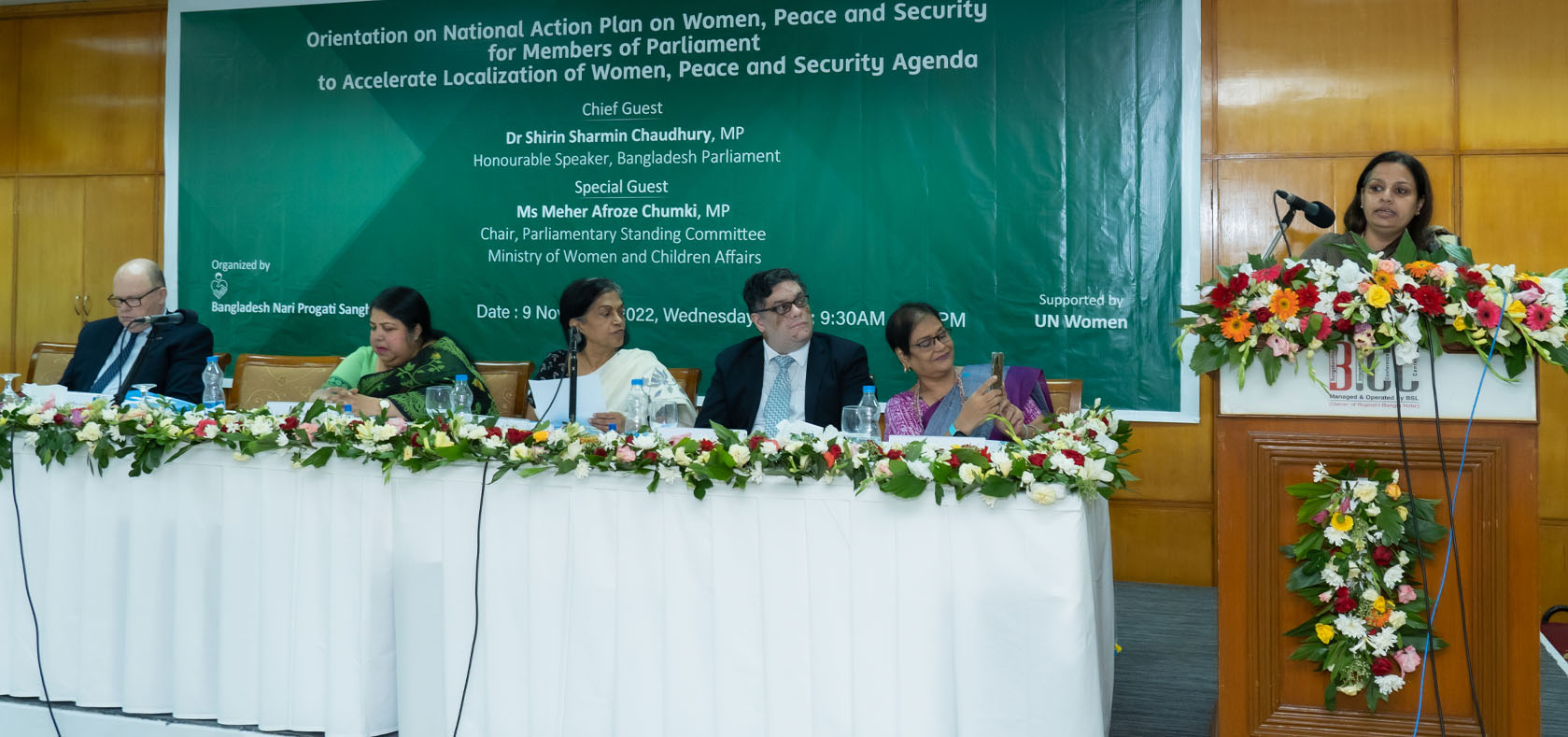Orientation on National Action Plan on Women, Peace and Security for Members of Parliament to Accelerate Localization of Women, Peace and Security Agenda
Speech by Gitanjali Singh, Country Representative, UN Women Bangladesh hosted by Bangladesh Nari Progati Sangha (BNPS) and UN Women on 9 November 2022, in Dhaka.
Date:
[Check against delivery]

UN Women engaged with Members of Parliament as key stakeholders in the National Action Plan for Women, Peace, and Security (NAP WPS) framework. An orientation session for Parliamentarians was held on 9 November 2022 in Dhaka, co-organized by UN Women and Bangladesh Nari Progati Sangha (BNPS), one of the CSO members of the IMCG. Key members of parliament, primarily women parliamentarians, along with the Speaker of Parliament, Dr. Shirin Sharmin Chaudhary, were present. An overview of the NAP WPS was presented, along with a discussion on why its implementation is crucial in the current global and national context held. A total of 95 participants were present at the event, including representatives from MOFA, the Governments of Australia and Canada, and media. UN Women’s Country Representative Gitanjali Singh was present at the orientation as a special guest and delivered her remarks.
Honourable Speaker, Members of Parliament, Excellencies, Distinguished guests, a very good afternoon. It is my pleasure to be here with you today at the orientation on the National Action Plan on Women Peace and Security organized by the Bangladesh Nari Progati Sangha.
As has been previously highlighted, Bangladesh has been a pioneer of the Women Peace and Security (WPS) agenda and remains firmly committed to the implementation of the UN Security Council Resolution 1325. Bangladesh’s contribution to preserving peace and promoting women’s role in peacebuilding and peacekeeping is lauded globally, and it demonstrates the country’s commitment to the WPS agenda.
This is a vitally important time for the Women, Peace, and Security agenda. Globally, we are witnessing a reversal in generational gains in women’s rights taking place against surging threats to security. Violent conflict, displacement, the repercussions of the global pandemic, the growing climate emergency and the looming economic recession are all taking an exacting toll on women and girls.
I would like to take the opportunity today to highlight three key points.
First, the Bangladesh NAP was developed in a very participatory manner with extensive engagement with women’s groups and civil society organisations. It is critical the same spirit is maintained as we move towards implementation and localization of the NAP. We know the pursuit of inclusive and sustainable peace demands the full participation and leadership of women and we must ensure this.
Two, now that the NAP timeline has been extended, adequate resources, need to be allocated by line ministries and departments to ensure effective implementation, localization, and monitoring of the NAP. We know, financing is key to translating commitments into concrete actions and changes in women’s lives.
Three, Bangladesh has recognized the “Bironganas” as freedom fighters and provided a stipend to them. They have raised the need for dignity, housing, health care and educational/livelihood support for their children. This support must continue. We know gender inequality as the root cause and invisible driver of sexual violence, in times of war and peace. Bangladesh has an opportunity to show how CRSV is recognized and addressed taking a survivor centred approach.
I would like to end by quoting from the UN Secretary-General’s 2022 report on Women and Peace and Security, “The women and peace and security agenda is not just an answer to historic wrongs and marginalization, but an opportunity to do things differently. Opening the door to inclusion and participation would result in giant steps forward in conflict-prevention and peacebuilding.[1]
Thank you.
[1] Women and Peace and Security: Report of the Secretary-General, S/2022/740. 5 October 2022
References: www.unwomen.org, https://www.un.org/sexualviolenceinconflict